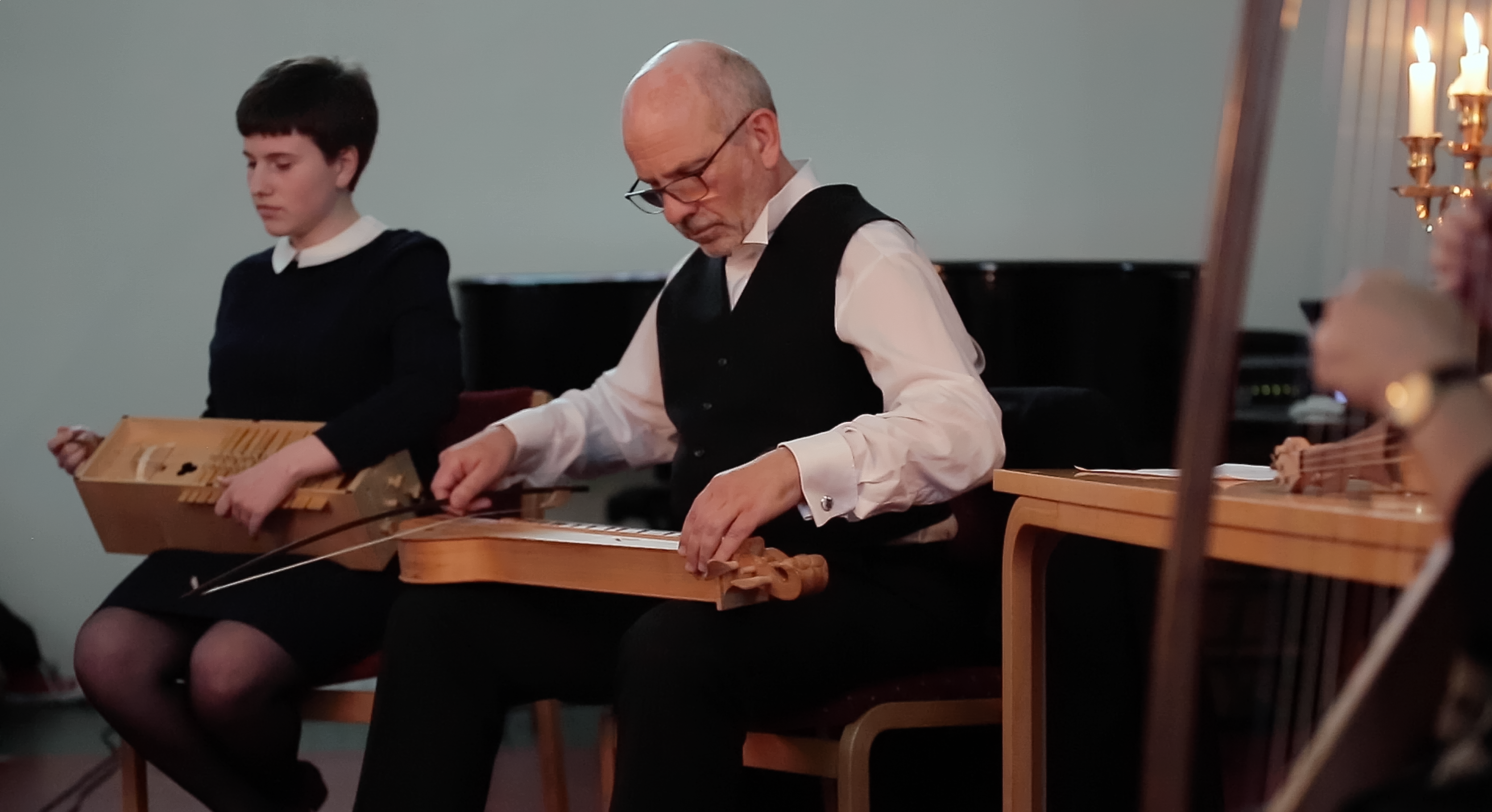Collected Songs
The Poems of Vatnsenda-Rose
Vísur Vatnsenda-Rósu
Vísur Vatnsenda-Rósu (English: „Verses by Rosa of Vatnsendi“) is a traditional Icelandic song. The lyrics are a poem written by Rósa Guðmundsdóttir (1795–1855); the melody is a traditional lullaby, arranged by Jón Ásgeirsson (1928–) in 1960.
Thanks to Kolfinna Sigurvinsdóttir, Ingibjörg Fríða Helgadóttir, Guðrún Jóhanna Ólafsdóttir
performed by Duo Atlantica at Folk Music Festival 2018, Siglufjörður, Iceland
Video: Discover Folkmusic
DoP: Anja Simon
Audio: Árni Möller
Vísur Vatnsenda-Rósu (English: „Verses by Rosa of Vatnsendi“) is a traditional Icelandic song. The lyrics are a poem written by Rósa Guðmundsdóttir (1795–1855); the melody is a traditional lullaby, arranged by Jón Ásgeirsson (1928–) in 1960.
Thanks to Kolfinna Sigurvinsdóttir, Ingibjörg Fríða Helgadóttir, Guðrún Jóhanna Ólafsdóttir
performed by Duo Atlantica at Folk Music Festival 2018, Siglufjörður, Iceland
Video: Discover Folkmusic
DoP: Anja Simon
Audio: Árni Möller
Beautifully sings the swan
Fagurt syngur svanurinn
A traditional dance poem. Bjarni Þorsteinsson heard the tune from Rannveig Gísladóttir of Skarðdalskot in Siglufjörður ca. 1900. The text is included (item 39) in an 1854 Copenhagen edition of traditional Icelandic verse edited by Svend Grundtvig and Jón Sigurðsson.
Thanks to Eyjólfur Eyjólfsson.
performed by Rikini Ensemble (Spilmenn Ríkínís) at Folk Music Festival, Siglufjörður Iceland 2018
Video: Discover Folkmusic
DoP: Anja Simon
Audio: Árni Möller
A traditional dance poem. Bjarni Þorsteinsson heard the tune from Rannveig Gísladóttir of Skarðdalskot in Siglufjörður ca. 1900. The text is included (item 39) in an 1854 Copenhagen edition of traditional Icelandic verse edited by Svend Grundtvig and Jón Sigurðsson.
Thanks to Eyjólfur Eyjólfsson.
performed by Rikini Ensemble (Spilmenn Ríkínís) at Folk Music Festival, Siglufjörður Iceland 2018
Video: Discover Folkmusic
DoP: Anja Simon
Audio: Árni Möller
We two stood on a meadow
Stóðum tvö í túni
Stóðum tvö í túni is a love poem from Víglundar saga. The love song describes the farewell of a pair of lovers. The man is going to leave his home with the Vikings.
Funi are Bára Grímsdóttir and Chris Foster
performed by Funi at Folk Music Festival, Siglufjörður Iceland 2018
Video: Discover Folkmusic
DoP: Anja Simon
Audio: Árni Möller
Stóðum tvö í túni is a love poem from Víglundar saga. The love song describes the farewell of a pair of lovers. The man is going to leave his home with the Vikings.
Funi are Bára Grímsdóttir and Chris Foster
performed by Funi at Folk Music Festival, Siglufjörður Iceland 2018
Video: Discover Folkmusic
DoP: Anja Simon
Audio: Árni Möller
Fallandason is sworn to death
Feigur Fallandason
A poem by Hjálmar Jónsson (called Bólu-Hjálmar) 1796-1875.
This song is about a poet who is getting too old to write, and how only things waiting for him is the open grave. The lyrics are from the early 19th century, but the melody is much, much older.
Herring Era Museum, Siglufjörður 2018, Iceland
performed by Gustaf Danielsson, Örlygur Kristfinnsson
Video: Discover Folkmusic
DoP: Anne Luft
Audio: Moritz Degen
A poem by Hjálmar Jónsson (called Bólu-Hjálmar) 1796-1875.
This song is about a poet who is getting too old to write, and how only things waiting for him is the open grave. The lyrics are from the early 19th century, but the melody is much, much older.
Herring Era Museum, Siglufjörður 2018, Iceland
performed by Gustaf Danielsson, Örlygur Kristfinnsson
Video: Discover Folkmusic
DoP: Anne Luft
Audio: Moritz Degen
Svanfríður Halldórsdottir
Kindavisur
Svanfríður Halldórsdottir runs a sheep farm in Ólafsfjörður (North Iceland) with her husband Gunnar Jóhannsson. She is a passionate and very good singer of the ancient Icelandic rhymes (Rima). Her husband, Gunnar Jóhannsson writes poems about the work and about the area where they live and Svanfríður likes to sing them, also to their sheep.
Olafsfjörður 2018, Iceland
Video: Discover Folkmusic
DoP: Anne Luft
Audio: Moritz Degen
Svanfríður Halldórsdottir runs a sheep farm in Ólafsfjörður (North Iceland) with her husband Gunnar Jóhannsson. She is a passionate and very good singer of the ancient Icelandic rhymes (Rima). Her husband, Gunnar Jóhannsson writes poems about the work and about the area where they live and Svanfríður likes to sing them, also to their sheep.
Olafsfjörður 2018, Iceland
Video: Discover Folkmusic
DoP: Anne Luft
Audio: Moritz Degen
Rikini Ensemble
Ný upp rann þín sumarsól
The tune was noted down by pastor Bjarni Þorsteinsson from Þorleifur Þorleifsson of Siglunes, who claimed that the only person he had heard sing it was Pastor Jón of Siglunes. Jón must have learnt it while growing up at Grenjaðarstaður. Text by Þorvald Böðvarsson, provost at Holt (d. 1836).
An arrangement by Örn Magnússon.
performed by Rikini Ensemble (Spilmenn Ríkínís) at Folk Music Festival, Siglufjörður Iceland 2018
Video: Discover Folkmusic
DoP: Anja Simon
Audio: Árni Möller
The tune was noted down by pastor Bjarni Þorsteinsson from Þorleifur Þorleifsson of Siglunes, who claimed that the only person he had heard sing it was Pastor Jón of Siglunes. Jón must have learnt it while growing up at Grenjaðarstaður. Text by Þorvald Böðvarsson, provost at Holt (d. 1836).
An arrangement by Örn Magnússon.
performed by Rikini Ensemble (Spilmenn Ríkínís) at Folk Music Festival, Siglufjörður Iceland 2018
Video: Discover Folkmusic
DoP: Anja Simon
Audio: Árni Möller
Gustaf Danielsson
Meðan aðrir una sér við ys og glauminn
The Poem is from 1918, from Sveinbjörn Björnsson.
An older man is writing to his friend, telling him how he spends his time nowadays. Instead of having a good time eating and drinking, he writes poems, poems from his memories, good memories from earlier days. The Title is taken from the first line, in the first verse: „Meðan aðrir una sér við ys og glauminn“.
Rimur (the Icelandic word for ‘rhymes’) are long cycles of poetic verse delivered in a distinctively Icelandic half-sung/half chanted style. The Rimur are one of Iceland’s oldest traditions. They stretch as far back as the fourteenth century and have their roots in the country’s ancient literature.
The Poem is from 1918, from Sveinbjörn Björnsson.
An older man is writing to his friend, telling him how he spends his time nowadays. Instead of having a good time eating and drinking, he writes poems, poems from his memories, good memories from earlier days. The Title is taken from the first line, in the first verse: „Meðan aðrir una sér við ys og glauminn“.
Rimur (the Icelandic word for ‘rhymes’) are long cycles of poetic verse delivered in a distinctively Icelandic half-sung/half chanted style. The Rimur are one of Iceland’s oldest traditions. They stretch as far back as the fourteenth century and have their roots in the country’s ancient literature.
Sleep now softly, little one
Sofðu unga ástin mín
Sofðu unga ástin mín was written for an Icelandic play called Fjalla-Eyvindur (Eyvindur of the Mountains) by Jóhann Sigurjónsson. It’s based on the legend of famous Icelandic outlaws, Eyvindur and his wife Halla. In this particular scene towards the end of the play, Halla throws their newborn child down a waterfall. They are on the run from the authorities and this is an act of desperation. Before she drops the baby down the waterfall she sings a lullaby, Sofðu unga ástin mín. In spite of it being really sad it’s a beautiful lullaby and very popular among Icelanders.
Thanks to Anna & Vala Yates .
performed by Cantoque Ensemble at Folk Music Festival, Siglufjörður Iceland 2018
Video: Discover Folkmusic
DoP: Anja Simon
Audio: Árni Möller
Sofðu unga ástin mín was written for an Icelandic play called Fjalla-Eyvindur (Eyvindur of the Mountains) by Jóhann Sigurjónsson. It’s based on the legend of famous Icelandic outlaws, Eyvindur and his wife Halla. In this particular scene towards the end of the play, Halla throws their newborn child down a waterfall. They are on the run from the authorities and this is an act of desperation. Before she drops the baby down the waterfall she sings a lullaby, Sofðu unga ástin mín. In spite of it being really sad it’s a beautiful lullaby and very popular among Icelanders.
Thanks to Anna & Vala Yates .
performed by Cantoque Ensemble at Folk Music Festival, Siglufjörður Iceland 2018
Video: Discover Folkmusic
DoP: Anja Simon
Audio: Árni Möller
Burn Ye Beacons
Brennið þið vitar
This song, made by Páll Ísólfsson by lyrics of Davíð Stefánsson tells about the Icelandic fishermen, standing by the steer of their ship on the way to land in the dark of the night. They are praying to see the beacon lights from the lighthouse.
Iceland Youth Symphony Orchestra
Conductor: Hallfridur Ólafsdóttir
Male Choir Fóstbræður
Male choir in Fjallabyggð (Siglufjord and Olafsfjord)
Male Choir of Dalvík
Video: Discover Folkmusic
DoP: Anja Simon
Audio: Árni Möller
This song, made by Páll Ísólfsson by lyrics of Davíð Stefánsson tells about the Icelandic fishermen, standing by the steer of their ship on the way to land in the dark of the night. They are praying to see the beacon lights from the lighthouse.
Iceland Youth Symphony Orchestra
Conductor: Hallfridur Ólafsdóttir
Male Choir Fóstbræður
Male choir in Fjallabyggð (Siglufjord and Olafsfjord)
Male Choir of Dalvík
Video: Discover Folkmusic
DoP: Anja Simon
Audio: Árni Möller











